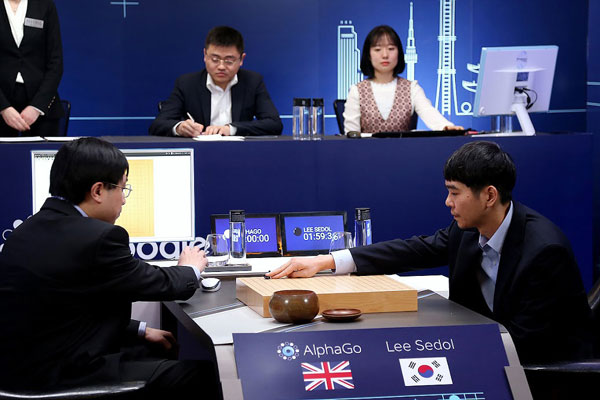What I learned from AlphaGo's win
- By Wu Zheng
 0 Comment(s)
0 Comment(s) Print
Print E-mail CRI, March 24, 2016
E-mail CRI, March 24, 2016
|
|
|
The world's top Go player Lee Sedol (R) puts his first stone during the last match of the Google DeepMind Challenge Match against Google's artificial intelligence program AlphaGo in Seoul, South Korea, in this handout picture provided by Google and released by Yonhap on March 15, 2016.[Photo/Agencies] |
AlphaGo, a computer program developed by Google, made it abundantly clear on Tuesday (March 15) that it has left humans in dust. It grabbed a sweeping 4-1 series victory in games against South Korean Go grandmaster Lee Se-dol.
Google estimated that 60 million people in China, where Go is still a pastime for many followers, watched the first round of match on March 9.
I was one of them, but I don't know much about the game. I watched because my 7-year-old son is learning weiqi since he was five years old. While the competition sparked a worldwide debate on whether artificial intelligence could pose a threat to humankind, my immediate concern is whether my son should continue to learn the ancient gaming art, or he should better switch to learn the modern computer coding technique.
That brought me to the probing that helped me chose weiqi for him to learn.
The game Go originated in ancient China more than 2,500 years ago, and is one of the oldest board games played today. It was considered one of the four essential arts of a cultured Chinese scholar in antiquity.
The rules of the game are relatively simple, in which the aim is to surround more territory than the opponent, but there is significant strategy involved in the game, and the number of possible games is vast, making it an extremely complex game to play. To play well, it requires good mental discipline, a deep philosophical attitude, and a multi-campaign mentality.
More importantly, I learned the game of Go is all about harmony philosophy. It is about sharing through extending influence, not confrontation. In comparison, Western chess is basically a game of attack in which you must take your fight to the enemy to win; you will not win just defending. In contrast, with weiqi's objective of spreading influence, one generally only captures opponent if it is for strategic locations and when in ones acquired sphere of influence. It is never efficient to capture just for capture's sake.
"Weiqi is probably the only board game that along the way of playing a set, more and more 'stones' (black and white playing pieces) appear on the board. In all other games, the more you play, less playing pieces left on the board," my son's trainer told me so.
As an incarnation of ancient Chinese culture, weiqi probably carries the gene of Chinese wisdom. The game trains people to take pleasure in the multiple answers, combinations and surprises which spring forth continuously from constantly new situations. Aggression is said to be calmed, while the soul learns serenity, harmony, and the joy of contemplating possibilities.
AlphaGo couldn't have defeated Lee Se-dol if it has not "learned" the wisdom and the art of Go. The competition itself is just about who can play a better Go game.
Putting into another way of saying, AlphaGo won the competition because it mastered the intricacy and ingenuity of the game through cutting-edge computing technology, a great example of synergy created by merging Eastern and Western wisdoms.
So, ideally, my son would be better prepared for the future world with both weiqi training and the ability of computer coding. For the time being, he will continue his weiqi lessons, so I decided.
The author is editor-in-chief at Shanghai Daily.







Go to Forum >>0 Comment(s)